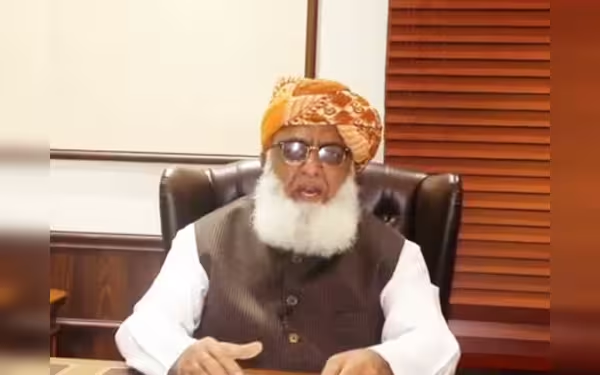Thursday, December 5, 2024 02:25 AM
Fazlur Rehman Criticizes Detention Laws in Pakistan
- Fazlur Rehman condemns changes to detention laws.
- Removal of Clause 8 raises human rights concerns.
- Political factions unite against arbitrary detentions.
 Image Credits: tribune.com.pk
Image Credits: tribune.com.pkFazlur Rehman criticizes recent detention laws in Pakistan, raising concerns over human rights and the implications of the 26th Constitutional Amendment.
In recent developments, the political landscape in Pakistan has been stirred by the remarks of Jamiat Ulema-e-Islam (JUI) Supremo Maulana Fazlur Rehman. He has raised significant concerns regarding the recent changes in legislation, particularly focusing on the removal of Clause 8 from the 26th Constitutional Amendment. This amendment has sparked a wave of rapid legislative actions that many believe infringe upon basic rights.
During a visit to Bilour House in Peshawar, where he extended condolences to senior Awami National Party (ANP) leader Ghulam Ahmad Bilour on the death of his brother, former Senator Ilyas Bilour, Maulana Fazlur Rehman articulated his apprehensions. He emphasized that the current detention laws are not only problematic but also violate fundamental human rights. His statements reflect a growing unease among various political factions regarding the implications of these legislative changes.
The removal of Clause 8 has raised eyebrows, as it is perceived to facilitate the government’s ability to detain individuals without due process. This has led to fears that such laws could be misused, potentially leading to arbitrary detentions and a crackdown on dissent. Maulana Fazlur Rehman’s comments resonate with many who advocate for the protection of civil liberties and the rule of law in Pakistan.
As the political discourse continues, it is crucial for citizens to remain informed about how these legislative changes may affect their rights. The balance between national security and individual freedoms is a delicate one, and it is essential for lawmakers to tread carefully. The voices of leaders like Maulana Fazlur Rehman serve as a reminder of the importance of safeguarding democratic principles and ensuring that the rights of all citizens are upheld.
The ongoing discussions surrounding the 26th Constitutional Amendment and its implications for detention laws highlight a critical juncture in Pakistan's political narrative. As citizens, it is our responsibility to engage with these issues, advocate for our rights, and hold our leaders accountable. The future of democracy in Pakistan hinges on our collective vigilance and commitment to justice.













